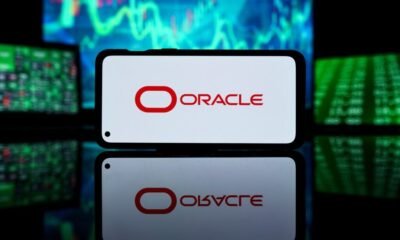Tools & Platforms
Trump’s AI Czar Says Tech Behind Chatbots Won’t Kill Jobs: ‘Narrative Is Overhyped’ – NVIDIA (NASDAQ:NVDA)

As debates over AI-driven job displacement intensify, Silicon Valley investor and economic commentator Balaji Srinivasan and White House AI and crypto czar David Sacks say the real story is that humans remain essential, guiding and verifying AI at both ends of the workflow.
What Happened: In a series of posts on X in June, Srinivasan challenged the popular notion that AI can work autonomously from start to finish. “AI doesn’t do it end-to-end. It does it middle-to-middle,” he wrote. “The new bottlenecks are prompting and verifying.”
Srinivasan emphasized that AI prompting is scalable because it involves just typing, but verification, ensuring the AI’s output is accurate and usable, is not. “Verifying AI output involves much more than just typing,” he said. “For anything subtle, you need to read the code or text deeply.”
He added that this opens up a whole new category of roles: “AI will create many jobs in the broad area of verifying AI — proof of human, proof of authenticity, proof the output is not AI, proof the output is actually right.”
On Sunday, Sacks echoed the sentiment, writing, “Why the AI job loss narrative is overhyped: AI models still need to be prompted and verified, often iteratively, to drive business value.”
Why It Matters: These comments come amid a broader debate about the impact of AI on the job market.
In July, Nvidia Corp. NVDA CEO Jensen Huang said that AI will not eliminate jobs but rather transform them by automating mundane tasks and boosting productivity.
He called AI “the greatest technology equalizer of all time” and warned that those who don’t embrace it risk being left behind.
Same month, Vice President JD Vance said the Donald Trump administration aims to lead in AI by promoting innovation and reducing overregulation. He criticized the Joe Biden administration and Europe for being too fearful of AI’s risks, arguing that embracing AI will drive job growth and productivity.
Last month, ARK Invest CEO Cathie Wood warned that AI is disrupting entry-level jobs and contributing to rising unemployment among new college graduates. Citing a jump in recent graduate jobless rates to over 6%, she urged job seekers to upskill in AI to stay competitive as automation reshapes the labor market.
Read Next:
Photo Courtesy: khunkornStudio on Shutterstock.com
Disclaimer: This content was partially produced with the help of AI tools and was reviewed and published by Benzinga editors.
Tools & Platforms
Jeff Kirk Named Executive Vice President of Applied AI at Robots & Pencils

Jeff Kirk
Robots & Pencils, an AI-first, global digital innovation firm specializing in cloud-native web, mobile, and app modernization, today announced the executive appointment of Jeff Kirk as Executive Vice President of Applied AI. A seasoned technology leader with a career spanning global agencies, startups, and Fortune 100 enterprises, Kirk steps into this newly created role to accelerate the firm’s AI-first vision and unlock transformative outcomes for clients. As EVP of Applied AI, Kirk will lead the firm’s strategy and delivery of AI-powered and enterprise AI solutions across industries.
Explore how Robots & Pencils blends science and design to build market leaders.
Kirk’s track record speaks for itself, with AI breakthroughs that fueled customer engagement and business growth. He founded and scaled Moonshot, an intelligent digital products company later acquired by Pactera, where he spearheaded next-generation experiences in voice, augmented reality, and enterprise digitalization. At Amazon, he served as International Product & Technology Lead for Alexa, driving AI-powered personal assistant expansion to millions of households and users worldwide. Most recently, at bswift, Kirk led AI & Data as VP, delivering conversational AI breakthroughs with the award-winning Emma assistant and GenAI-powered EnrollPro decision support system.
Across each of these roles runs a common thread. Kirk builds and scales innovations that transform how industries work, creating technologies that move from experimental to essential at breathtaking speed.
“Jeff has been at the frontier of every major shift in digital innovation,” said Len Pagon, CEO of Robots & Pencils. “From shaping the future of eCommerce and mobile platforms at Brulant and Rosetta, to pioneering global voice AI at Amazon, to launching AI-driven customer experiences at bswift, Jeff has consistently delivered what’s next. He doesn’t just talk about AI. He builds products that millions use every day. With Jeff at the helm of Applied AI, Robots & Pencils is sharpening its challenger edge, helping clients leap ahead while legacy consultancies struggle to catch up. I’m energized by what this means for our clients and inspired by what it means for our people.”
Across two decades, Kirk has built a reputation for translating complex business requirements into enterprise-grade AI and technology solutions that scale, stick, and generate measurable results. His entrepreneurial mindset and hands-on leadership style uniquely position him to help clients experiment, activate, and operate AI across their businesses.
“Organizations and their employees are under pressure to innovate on behalf of customers while simultaneously learning to collaborate with a new type of co-worker: artificial intelligence,” said Kirk. “The steps we take together to learn to work differently will lead to the most outsized innovation in our industries. I’m thrilled to join Robots & Pencils to push the boundaries of what’s possible with AI, to deliver outcomes that matter for our clients and their customers, and to create opportunities for our teams to do the most meaningful work of their careers.”
Kirk began his career at Brulant and Rosetta, where he worked alongside Pagon and other Robots & Pencils’ executive team members, leading engineering and solutions architecture across content, commerce, mobile, and social platforms. His return to the fold marks both a reunion and a reinvention, positioning Robots & Pencils as a leader in applied AI at scale.
About Robots & Pencils
Robots & Pencils is a global digital innovation firm helping organizations modernize applications and unlock the full potential of AI, cloud-native technologies. With delivery centers in Canada, the U.S., Eastern Europe, and Latin America, and deep partnerships with AWS, Salesforce, Databricks, and others, the company offers a unique combination of UX excellence and elite engineering talent. Since 2009, Robots & Pencils has delivered forward-thinking solutions across Financial Services, Health Tech, Education, Consumer, Energy, and Technology sectors, earning a reputation as a nimble, high-value alternative to traditional global systems integrators. Visit us at robotsandpencils.com.
Tools & Platforms
Live-translating AirPods are a glimpse into how AI will shape the future of work

People mostly yawned through Apple’s new product lineup unveiled this week. It’s hard to get jazzed about the two millimeters of pocket space reclaimed by the thinner model.
But live-translating AirPods are one of the more exciting and tangible uses of AI I’ve seen so far. They foreshadow AI that doesn’t just make things cheaper, but makes entirely new things possible.
The new AirPods are a concrete example of something I’ve had trouble envisioning, 18 months into this hype cycle. It’s easy enough to see the cost savings from AI as technology replaces humans. But by PWC’s estimate, two-thirds of AI’s contributions to global economic growth will come not from gains in productivity but from gains in consumption. In this vision, AI will spark the creation of more goods that people want to buy, and make them available to more people.
Railroads didn’t just reduce the cost of shipping goods; they opened the West. Fiber-optic cable didn’t simply make communication easier, but birthed the internet. Transformative technologies create bigger pies, not just cheaper ones.
Language barriers act as invisible tariffs on the global economy. They add friction to financial markets, artificially constrain talent pools, and leave money stranded on the wrong side of comprehension. Flip that switch, and suddenly every market becomes accessible, and good ideas trapped behind a language wall get unleashed. Goldman Sachs can deploy its sharpest minds in Brazil without Portuguese fluency. My failed hunt for custom blazers in Hong Kong last year can become a completed transaction. (Also: tips for next time, please.) Netflix’s “localization” model becomes possible for new industries.
There’s something dystopian about a world where everyone is sporting AirPods all the time, but I suspect the future is heavy on wearables anyway. The question is whether that hardware expands or merely entertains. Technology that opens up new avenues meets the hype in a way that AI replacing baby investment bankers or advertising studios just doesn’t.
Tools & Platforms
MissionHires is betting on AI to make recruiting faster, fairer, and more human

When Alfredo Vaamonde talks about the future of recruiting, he’s quick to clarify one thing: he doesn’t see artificial intelligence as a replacement for recruiters. Instead, he sees it as their partner.
“Our focus is to empower recruiters, not replace them,” Vaamonde told Refresh Miami. “That’s why our company is called MissionHires.”
The Miami-based startup, co-founded by Vaamonde and his wife, Mariana Escolar, automates up to 80% of the hiring process – from sourcing candidates to screening and initial engagement – so recruiters can focus on what matters: connecting with top candidates and making better hiring decisions.
For recruiting and staffing agencies, that efficiency translates into saved time and reduced costs. Instead of paying placement fees of 15–25% of a candidate’s salary, MissionHires offers flat-fee, retainer-based pricing.
“We’re quick, we’re focused on quality, and we’re very cost-efficient,” Vaamonde said.
The company has recently shifted its focus toward staffing and recruiting firms rather than only individual employers. That move has given MissionHires recurring business, with agencies using the platform month after month to support their teams. Healthcare companies and startups remain key clients too, but agencies now represent the biggest growth opportunity.
The technology itself is designed to be simple for recruiters to adopt. After posting a job description, the AI creates an ideal candidate profile, finds both active and passive candidates, and reaches out to them across email, text, or LinkedIn. When candidates respond, they go through a 15–20 minute chat-based interview, where the AI can collect text, audio, or video responses depending on the client’s preference. The system then generates a detailed report with skills, strengths, and any flagged areas for review. Recruiters walk away with a shortlist of pre-screened candidates, ready for live interviews.
“We’re taking the manual, repetitive tasks off their plate so they can be more efficient and place people faster,” Vaamonde explained. That means more time spent actually engaging candidates and less time slogging through inboxes and resumes.
Since launching in January, MissionHires has been averaging about $10,000 in monthly revenue. The team remains lean – just four people, including the husband-and-wife founding duo – but the vision is big. Vaamonde sees MissionHires as industry-agnostic, built to empower staffing agencies, recruiters, and hiring teams anywhere in the world.
That perspective is rooted in Vaamonde’s international experience. After spending the past two years living in Madrid with his family, he moved back to Miami this summer to double down on building MissionHires. The return has given him a fresh look at how much the city has changed since his last company, Papa, was founded here.
“In 2018, nobody was here,” he said. “We were actually pressured by YC to stay in San Francisco, but we chose Miami because this is where our clients were. Back then, there wasn’t really a tech ecosystem.”
Now, he said, Miami is buzzing with entrepreneurial energy. “Just in the past two weeks, I’ve had breakfast and dinner with founders who had moved here from New York and California. That didn’t exist five years ago.”
Still, Vaamonde sees room for growth. He’d like to see more founders born and raised in Miami leading startups. “Most of the entrepreneurs you meet here today are transplants,” he said. “We need more local talent building businesses from the ground up.” He believes universities and large companies will play a crucial role in fostering that next generation of Miami-grown founders.
Pictured above: Alfredo Vaamonde and Mariana Escolar, co-founders of MissionHires
READ MORE IN REFRESH MIAMI:
-

 Business2 weeks ago
Business2 weeks agoThe Guardian view on Trump and the Fed: independence is no substitute for accountability | Editorial
-
Tools & Platforms1 month ago
Building Trust in Military AI Starts with Opening the Black Box – War on the Rocks
-

 Ethics & Policy2 months ago
Ethics & Policy2 months agoSDAIA Supports Saudi Arabia’s Leadership in Shaping Global AI Ethics, Policy, and Research – وكالة الأنباء السعودية
-

 Events & Conferences4 months ago
Events & Conferences4 months agoJourney to 1000 models: Scaling Instagram’s recommendation system
-

 Jobs & Careers2 months ago
Jobs & Careers2 months agoMumbai-based Perplexity Alternative Has 60k+ Users Without Funding
-

 Podcasts & Talks2 months ago
Podcasts & Talks2 months agoHappy 4th of July! 🎆 Made with Veo 3 in Gemini
-

 Education2 months ago
Education2 months agoMacron says UK and France have duty to tackle illegal migration ‘with humanity, solidarity and firmness’ – UK politics live | Politics
-

 Education2 months ago
Education2 months agoVEX Robotics launches AI-powered classroom robotics system
-

 Funding & Business2 months ago
Funding & Business2 months agoKayak and Expedia race to build AI travel agents that turn social posts into itineraries
-

 Podcasts & Talks2 months ago
Podcasts & Talks2 months agoOpenAI 🤝 @teamganassi






















